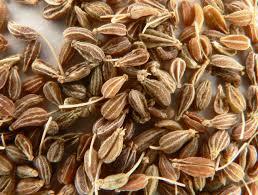
Aniseed Essential Oil
Aniseed Essential oil information
Our aniseed essential oil is extracted from the seeds of the herb Pimpinella anisum (also known as P. officinale and vulgare), of the Umbelliferae family. It has a pungent liquorice-like smell and is also known as anise and sweet cumin. It should not be confused with Illicium verum, which is star anise and belongs to the Illiciaceae family.
This warm, spicy essential oil is often used in aromatherapy to ease the discomfort of introverted and fearful people, while aiding the digestion, boosting the lungs and easing migraines and headaches.
Origin
Aniseed originated from the Middle East and is now cultivated in Europe, USA and North Africa. It is an annual herb, about 80 cm (2 feet) high with delicate feathery leaves, tiny white flowers and grayish-brown seeds.
Aniseed oil was revered by ancient civilizations, especially by the Romans, Egyptians and Greeks. The Romans used it in a spicy cake know as 'mustaceus', the Egyptians used it in bread, while the Greeks used it for its calming influence on the digestive tract.
Aniseed is used in liqueurs and cordials, toothpastes and mouthwashes. In India it is used as a breath sweetener and in Turkey, a popular alcoholic drink called 'raki ' is made from the seeds.
The oil is extracted by steam distillation from the dried ripe fruit and seeds.
The essential oil includes the following chemical compounds; a-pinene, camphene, b-pinene, linalool, cis-anethole, trans-anethole, safrole, anisaldehyde and acetoanisole.
Precautions Aniseed oil is a very potent and the anethole contained in it can cause dermatitis in some individuals. It is best avoided in problem skin conditions. In large doses it can also slow down the circulation and can cause cerebral congestion.
It must be avoided during pregnancy.
Therapeutic Properties
The therapeutic properties of aniseed oil are antiseptic, antispasmodic, carminative, diuretic, expectorant, stimulant, galactagogue, stomachic, insecticide, laxative and parasiticide.
Uses
Aniseed oil can be useful in the treatment of muscular aches and pains, rheumatism, bronchitis, whooping cough, colic, cramp, flatulence, indigestion, catarrh and hangovers.
Summary
Aniseed oil is not only helpful for its effect on the digestive system, it is also a general tonic to the circulatory system and the respiratory tract. It helps to calm the nerves of tense and anxiety ridden people. It also calms menstrual pains and eases nauseous migraines, while stimulating the lungs to expel phlegm.
- Burners and vaporizers
- In vapor therapy, aniseed oil is useful for asthma, colds and all breathing problems, as well as quelling nausea and vomiting.
- In vapor therapy, aniseed oil is useful for asthma, colds and all breathing problems, as well as quelling nausea and vomiting.
- Drops of oil on a handkerchief
- When used on a handkerchief to smell at, it is useful for settling digestive problems and can also benefit migraine and vertigo sufferers.
- When used on a handkerchief to smell at, it is useful for settling digestive problems and can also benefit migraine and vertigo sufferers.
